|
Confederate Memorial Stone Dedication
at St. Alban's
Episcopal Church
By
Rebecca
Blackwell Drake
|
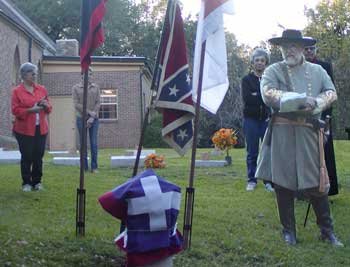
Capt. Mike Beiser, Co. E, 46th
Mississippi Infantry, reads the letter written by Sarah F.
Bigelow on June 16, 1863
|
|
On October 31, 2009, church members, Civil War
reenactors, SCV camps, and friends gathered at St. Alban’s Episcopal
Church at Bovina to dedicate a Confederate headstone for Corporal
Robert Hyde Woodson, Co. F, 3rd Missouri Infantry. Woodson died of
wounds he received during the May 16th Battle of Champion Hill.
After the battle, as the Confederate
army moved back to Vicksburg, Corporal Woodson and four other
critically wounded soldiers were left at the Masonic Lodge in
Bovina. Here, they were cared for by the women of the town.
As a result of injuries received
during the battle, Woodson’s leg was amputated above the knee and
the leg became infected. He fought to live and his spirits were good
but in early June his condition worsened. Corp. Woodson passed away
on June 14, 1863, and was buried in the cemetery at St. Alban’s
Episcopal Church.
Moved by the loss of such a fine young
man, Sarah F. Bigelow, one of the women nursing him, penned a letter
to Corporal Woodson’s mother informing her of her son’s death. Mike
Beiser, re-enactor, read Mrs. Bigelow’s letter to the crowd as many
wiped away their tears.
|
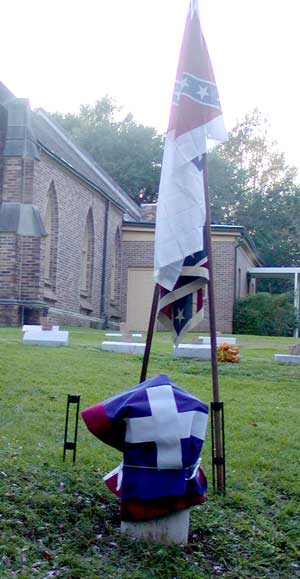 Bovina, Warren County,
Mississippi Bovina, Warren County,
Mississippi
June 16, 1863.
DEAR MRS. WOODSON,
In addressing you at this
time, I fulfill an engagement made a few days since.
On May 16, a battle was
fought at Champion Hill in Hinds county (about twelve
miles from here) in which your son, Robert Hyde Woodson,
was engaged. He was among the wounded, his left leg
being so badly injured that amputation above the knee
was necessary. The Confederate army was compelled to
fall back to Big Black River and then to Vicksburg, ten
miles from here. Your son and four other wounded
Confederates were left at the Masonic Lodge at this
place. It was thought he was doing very well for three
weeks, but toward the last he failed rapidly, till
finally, nature gave way and, quietly and peacefully, he
expired at 10 a. m., June 14, 1863.
I was one of several
ladies who visited the hospital daily to render what
service we could to our poor wounded soldiers; and all
that we could do was done to make them comfortable.
Mrs. Col. Dockery and
myself assisted in the care of him the night but one,
previous to his death, and other ladies did the next
night.
Though so recently come
among us, his manly qualities, his patience, gentleness
and submission won the respect and admiration of all who
met him. When it was thought he could not survive (it
being impossible to send for a clergyman) I inquired of
him if he was a member of the church, to which he
replied that he was not but that he had seriously
thought of becoming so; and when asked if he knew he had
but little time left on earth, he replied "his trust was
in Jesus." He appeared to be perfectly conscious at the
time, but too weak to converse much.
I asked him if I should
write to you, of whom he had frequently spoken, and what
I should say: he could not speak but made an affirmative
motion, and several times seemed trying to speak but
could not, excepting to say, after I had read some of
the prayers for the visitation of the sick, "They are
good prayers."
Tearful eyes and sorrowing
hearts surrounded his dying bed, and all regretted that
one so young and gifted must so soon be a martyr for his
country's cause.
His remains lie in our churchyard (Episcopal) near-by,
and his grave will be a cherished spot to all who knew
him.
That God may comfort you
under this afflicting dispensation, is the desire of
Yours very respectfully,
SARAH F. BIGELOW
*AND THUS A NOBEL YOUNG
AND GALLANT SOLDIER ENTERED THE “BIVOUC OF THE DEAD.
|
As the sun was setting and casting a
rainbow of colors throughout the historic cemetery, Corporal Robert
Woodson’s Confederate headstone, draped in a Missouri flag, was
unveiled. Reverend Billie Abraham officiated, reading scripture and
offering up prayers for the deceased and his family. The
re-enactors, Union and Confederate, honored Corporal Woodson with an
infantry salute - the sound of gunfire resonating in the night air.
Spellbound, the crowd appeared transfixed by the tragic event which
happened 146 years ago. As the sun slowly dipped behind the trees
and the closing prayers were said, many watched as a tall
flowering bush, laden with pink flowers, slowly began to cast some of
its delicate petals to the wind. The blossoms drifted to the ground
as if to cover the new headstone with a fresh bouquet of
flowers.
The moment was magical and brought to
mind a poem written by William Forman Dunbar at the close of the
war:
O ye, in silent comradeship asleep,
In the long bivouac of the martyred dead,
Ye are not yet forgotten – nor can be
While in this fair magnolia land there blooms
A fragrant flower with which to deck your grave.
Sleep on Corporal Robert Goodson,
soldier at rest. For at St. Alban’s there will always be flowers
with which to deck your grave and the promise that you will not be
forgotten.
|
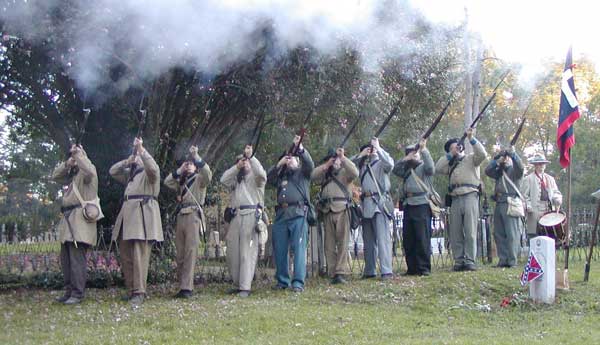
Union and Confederate
infantry salute |
|
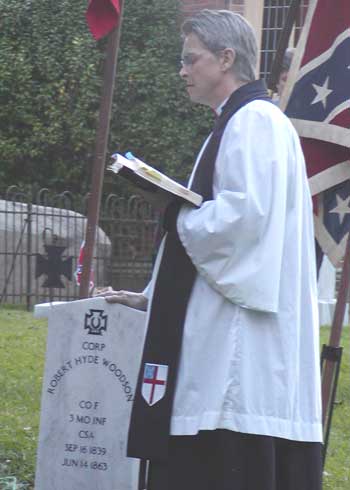
Reverend Billie Abraham,
St. Alban's Episcopal Church, officiates Memorial
Service |
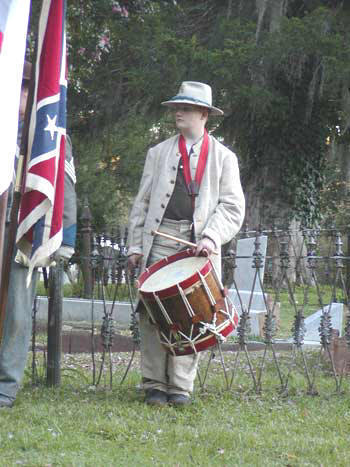
Little Drummer Boy |
|
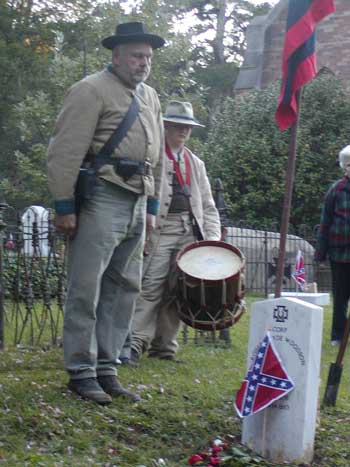
Private Robert Myers, Co.
E, 48th Mississippi Infantry, places a Confederate flag
beside the Memorial Stone |
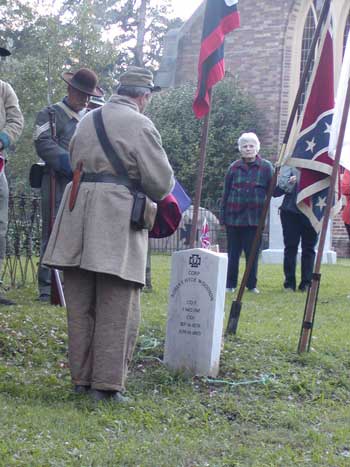
Captain Charles Tucker,
Co. A, 32nd Mississippi Infantry, unveils headstone |
|

 Bovina, Warren County,
Mississippi
Bovina, Warren County,
Mississippi



